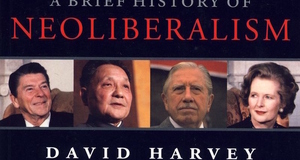|
From Cornell International Affairs Review VOL. 1 NO. 2 Fragile Foundations and Infant Institutions: The Case of Non-Reform in Haiti
By Katie Engelhart
Cornell International Affairs Review
2008, Vol. 1 No. 2 | pg. 2/2 | «
Economic scarcity has yielded a fragile working class base which is unable to mobilize on the grounds of self-interest and push for economic reform from below. According to Fatton Jr., “Material scarcity had certain perverse advantages for the continuity of dictatorship.”32 Democratization has not led to the formation of a strong working class; instead, extremely high levels of poverty have “produced a bourgeoisie and a working class that are both, at best, utterly small, embryonic, and fragile.” Currently, the working class represents only 9 percent of the labor force, and this number was consistently lower in the past.33 The absence of a strong working class eases the pressure on the government to enact the neoliberal reforms which are so crucial to Haiti’s long-term economic growth. Fatton Jr. warns that unless civil society can generate an effective political strategy from below, a process of “redictatorialization” may occur.34
Institutional weakness is finally evident in the business community’s lack of autonomous power. In Haiti, the business community has been tied organically to the state since the Duvalier dictatorship. As a result of the executive’s power, “if it wants to continue to do business and/or move into new ventures, the possessing class, more often than not, has to buy ‘protection’ from the ruling class.”35 Under a persisting system of crony-capitalism, favors are doled out by the government to preferred businesses and the stability of the business community is inextricably linked to government interests. Unity between the government and the business class “is rooted in an opportunistic convergence of interests.”36 This organic link to the state prevents the business community from taking action to bring about neoliberal reform; its interests are more effectively served by acquiescing to the wishes of the government in power. Moreover, the system of crony capitalism works to advance friends of the political elite, not the best interest of the national economy.37
Persisting social instability suggests that Haiti will not have the necessary institutional foundation to pursue neoliberal reform in the near future. Von Einsiedel and Malone argue that a fundamental challenge to the construction of strong, democratic institutions is Haiti’s lack of human capital. Eighty percent of Haitians with college degrees live out of the country and “the lack of skilled Haitians to build up state institutions presents a severe development challenge.”38 According to Alex Dupuy, President Rene Preval faces “the classic contradictions of the populist politician. In a country in which 80 percent of the population is unemployed and annual per capita income is less than US$400, Preval realizes that the people who voted for him expect him to prioritize their need for access to jobs, food, health care, housing, education, and security.”39 The need for neoliberal reform will thus continue to appear secondary.
According to Fatton Jr., Haiti is shaped by a myriad of external forces, which confine the country to complete dependence.40 “External factors remain decisive and in some instances determine the shape of Haitian politics, for the country’s material well-being is utterly dependent on the whims of the world economy and the demands of foreign financial organizations.”41 Because of the country’s material dependence, Haiti’s economic program is in large part dictated by the extent and character of international, and specifically American, involvement. International structural conditions remove Haiti’s economic agency.
United States policy is responsible for the modest opening up that has occurred in Haiti in the past few decades; this American policy is independent of the specific regime in power in Haiti. The United States continues to push for liberal-market societies within its ‘zone of influence.’ In limited cases, this concerted American effort has led to modest progress in the move towards neoliberalism.42 American involvement with the Duvalier dictatorship illustrates clearly how Haitian economic strategy is entangled with that of the United States. In mid-1977, Duvalier began to yield to American pressure to ameliorate certain aspects of its economic policy. In November 1979, in return for increased American aid and under pressure from President Jimmy Carter, Duvalier ordered a series of ministerial and budgetary reforms and hesitantly accepted limited economic liberalization.43
American involvement with Aristide mirrored its involvement under Duvalier. The U.S. presence in Haiti acted in opposition to the Haitian administration, in an attempt to liberalize the economy. American influence over Aristide would yield two main results. First, “once in power, Aristide… was forced to adopt extremely pragmatic economic policies that never went beyond the World Bank’s vision of ‘basic needs.’” Thus, American influence dictated the nature and extent of economic reform. Second, “the American intervention opened up a limited political space to struggle for a more equitable pattern of economic development.”44 American involvement thus forced the Haitian administration to open up at least minimally to pressure from below.
American goals for Haiti have remained steadfast over time, as has the unwillingness of Haitian governments to enact neoliberal reform from above. Thus, the effect of this American involvement has remained consistently modest. Furthermore, the ideology driving American efforts has little to do with the specifics of the regime in power in Haiti and more to do with domestic factors within the United States. As Smith argues, American “domestic politics became the driving force behind U.S. policy.”45 Thus, international structural conditions, which allow for the primacy of American interests, have largely dictated levels of neoliberal reform.
Despite some limited success in opening the Haitian economy, international involvement has had some unintended negative consequences, one of which is the weakening of the Haitian state. This weakening is brought about first by international pressure from global superpowers. According to Fatton Jr., increasing international pressure means that “Preval seems condemned to adopt a structural adjustment program even if it may generate more inequalities and popular discontent.”46
Thus, when superpower interests contrast those of the Haitian state, the Haitian state is subjugated and weakened. Second, the weakening is brought about by international donor agencies. According to Kapur and Naim, “size matters!” In very poor countries like Haiti, law-based democratic governance faces many obstacles. When the IMP becomes involved, its dominance vis-à-vis Haiti is asymmetric; the Haitian government is thus marginalized in the process of policy formation.47 This weakening of the state could perversely affect the very neoliberal reform which the international community seeks to bring about.
Secondly, a reliance on foreign aid sources short-circuits the process of neoliberal reform. International organizations have transformed Haiti into “the Republique des Organisations Nongouvernementales (ONGs),” or, the Republic of NGOs.48 Reliance on aid has prevented governments from facing economic crisis; thus, governments have not been forced to diversity the economy and to encourage export-oriented growth. Much of the annual budget is still derived from foreign aid.49 However, this economic security, dependent so heavily on the sentiments of international agencies, is fragile. Furthermore, short-term aid may directly crowd out long-term business investment or, indirectly prevent the creation of viable financial institutions through which investment could be channeled. Currently Haiti’s dependence on aid shows no sign of being severed by the international community; on July 25, 2006, at a conference in Port-au-Prince, donor nations pledged approximately $750 million in new aid for Haiti.50
According to Kurt Weyland, Latin American countries have been able to successfully enact neoliberalism “when they faced dramatic crises, and the population was therefore prepared to swallow the bitter pill of tough stabilization.”51 However, this argument fails in Haiti, where ‘dramatic crises’ and inflationary pressures have neither encouraged the populace to, at least tacitly, accept the short-term costs of reform, nor provoked governments to open the Haitian economy. Rather, the past decades of instability have created an environment of permanent crisis. In this context, ideology is rendered irrelevant and economic strategy remains independent of the type of regime in power. Political instability, weak institutions and an omnipotent international presence have ultimately prevented both authoritarian and democratic regimes from successfully implementing neoliberalism.
- Arthur S. Banks, et al. eds. Political Handbook of the World 2005-2006. (Washington: CQ Press, 2006), 482-483.
- Alex Dupuy. “Haiti Election 2006: A Pyrrhic Victory for René Préval?” Latin American Perspectives 248 (2006): 133.
- Arthur S. Banks, et al. eds. Political Handbook of the World 2005-2006. (Washington: CQ Press, 2006), 483.
- Arthur S. Banks, et al. eds. Political Handbook of the World 2005-2006. (Washington: CQ Press, 2006), 482.
- “Haiti: An Uphill Struggle.” Economist 379 (2006).
- Robert Fatton Jr.. “The Impairments of Democratization: Haiti in Comparative Perspective.” Comparative Politics 31 (1999): 222.
- Irma Alonso T., ed. Caribbean Economies in the Twenty-First Century. (Gainesville, Florida: University Press of Florida, 2002), 55.
- “Country Report: Haiti.” (2006)
- Arthur S. Banks, et al. eds. Political Handbook of the World 2005-2006. (Washington: CQ Press, 2006), 485.
- Irma Alonso T., ed. Caribbean Economies in the Twenty-First Century. (Gainesville, Florida: University Press of Florida, 2002), 56.
- Robert Fatton Jr.. Haiti’s Predatory Republic: The Unending Transition to Democracy. (Boulder: Lynne Rienner Publishers, 2002), 57.
- Robert Fatton Jr. Haiti’s Predatory Republic: The Unending Transition to Democracy. (Boulder: Lynne Rienner Publishers, 2002), 79.
- Robert Fatton Jr. Haiti’s Predatory Republic: The Unending Transition to Democracy. (Boulder: Lynne Rienner Publishers, 2002), 79.
- “Haiti: An Uphill Struggle.” Economist 379 (2006).
- David M. Malone and Sebastian Von Einsiedel. “Peace and Democracy for Haiti: A UN Mission Impossible?” International Relations 20 (2006): 163.
- “Country Report: Haiti.” (2006)
- Alex Dupuy. “Haiti Election 2006: A Pyrrhic Victory for René Préval?” Latin American Perspectives 148 (2006): 132-133.
- David M. Malone and Sebastian Von Einsiedel. “Peace and Democracy for Haiti: A UN Mission Impossible?” International Relations 20 (2006): 153.
- Robert Fatton Jr. Haiti’s Predatory Republic: The Unending Transition to Democracy. (Boulder: Lynne Rienner Publishers, 2002), 38.
- Janelle Conaway. “Help for Haiti.” Americas 58 (2006).
- Robert Fatton Jr. “The Impairments of Democratization: Haiti in Comparative Perspective.” Comparative Politics 31 (1999): 209.
- Robert Fatton Jr. Haiti’s Predatory Republic: The Unending Transition to Democracy. (Boulder: Lynne Rienner Publishers, 2002), xi.
- David M. Malone and Sebastian Von Einsiedel. “Peace and Democracy for Haiti: A UN Mission Impossible?” International Relations 20 (2006): 154.
- David M. Malone and Sebastian Von Einsiedel. “Peace and Democracy for Haiti: A UN Mission Impossible?” International Relations 20 (2006): 164.
- Devesh Kapur and Moises Naim. “The IMF and Democratic Governance.” Journal of Democracy 16 (2005): 89.
- Robert Fatton Jr. “The Impairments of Democratization: Haiti in Comparative Perspective.” Comparative Politics 31 (1999): 221.
- Arthur S. Banks, et al. eds. Political Handbook of the World 2005-2006. (Washington: CQ Press, 2006), 482.
- David M. Malone and Sebastian Von Einsiedel. “Peace and Democracy for Haiti: A UN Mission Impossible?” International Relations 20 (2006): 157-158.
- Arthur S. Banks, et al. eds. Political Handbook of the World 2005-2006. (Washington: CQ Press, 2006), 486.
- Robert Fatton Jr. “The Impairments of Democratization: Haiti in Comparative Perspective.” Comparative Politics 31 (1999): 222.
- “Country Report: Haiti.” (2006)
- Robert Fatton Jr. “The Impairments of Democratization: Haiti in Comparative Perspective.” Comparative Politics 31 (1999): 216.
- Robert Fatton Jr. Haiti’s Predatory Republic: The Unending Transition to Democracy. (Boulder: Lynne Rienner Publishers, 2002), 34.
- Robert Fatton Jr. “The Impairments of Democratization: Haiti in Comparative Perspective.” Comparative Politics 31 (1999): 218.
- Robert Fatton Jr. Haiti’s Predatory Republic: The Unending Transition to Democracy. (Boulder: Lynne Rienner Publishers, 2002), 9.
- Robert Fatton Jr. Haiti’s Predatory Republic: The Unending Transition to Democracy. (Boulder: Lynne Rienner Publishers, 2002), 37.
- Peter Smith. Talons of the Eagle: Dynamics of U.S.-Latin American Relations. Oxford, 2000.
- David M. Malone and Sebastian Von Einsiedel. “Peace and Democracy for Haiti: A UN Mission Impossible?” International Relations 20 (2006): 165.
- Alex Dupuy. “Haiti Election 2006: A Pyrrhic Victory for René Préval?” Latin American Perspectives 148 (2006): 133.
- Robert Fatton Jr. Haiti’s Predatory Republic: The Unending Transition to Democracy. (Boulder: Lynne Rienner Publishers, 2002), 88.
- Robert Fatton Jr. “The Impairments of Democratization: Haiti in Comparative Perspective.” Comparative Politics 31 (1999): 218.
- Robert Fatton Jr. Haiti’s Predatory Republic: The Unending Transition to Democracy. (Boulder: Lynne Rienner Publishers, 2002), 39.
- Arthur S. Banks, et al. eds. Political Handbook of the World 2005-2006. (Washington: CQ Press, 2006), 483.
- Robert Fatton Jr. “The Impairments of Democratization: Haiti in Comparative Perspective.” Comparative Politics 31 (1999): 220-222.
- Peter Smith. Talons of the Eagle: Dynamics of U.S.-Latin American Relations. Oxford, 2000.
- Robert Fatton Jr. “The Impairments of Democratization: Haiti in Comparative Perspective.” Comparative Politics 31 (1999): 222.
- Devesh Kapur and Moises Naim. “The IMF and Democratic Governance.” Journal of Democracy 16 (2005): 89.
- Robert Fatton Jr. Haiti’s Predatory Republic: The Unending Transition to Democracy. (Boulder: Lynne Rienner Publishers, 2002), 29.
- Arthur S. Banks., et al. eds. Political Handbook of the World 2005-2006. (Washington: CQ Press, 2006), 482.
- Janelle Conaway. “Help for Haiti.” Americas 58 (2006).
- Kurt Weyland. “Neoliberalism and Democracy in Latin America: A Mixed Record.” Latin American Politics and Society 46 (2004): 137.
Endnotes
- Arthur S. Banks, et al. eds. Political Handbook of the World 2005-2006. (Washington: CQ Press, 2006), 482-483.
- Alex Dupuy. “Haiti Election 2006: A Pyrrhic Victory for René Préval?” Latin American Perspectives 248 (2006): 133.
- Arthur S. Banks, et al. eds. Political Handbook of the World 2005-2006. (Washington: CQ Press, 2006), 483.
- Arthur S. Banks, et al. eds. Political Handbook of the World 2005-2006. (Washington: CQ Press, 2006), 482.
- “Haiti: An Uphill Struggle.” Economist 379 (2006).
- Robert Fatton Jr.. “The Impairments of Democratization: Haiti in Comparative Perspective.” Comparative Politics 31 (1999): 222.
- Irma Alonso T., ed. Caribbean Economies in the Twenty-First Century. (Gainesville, Florida: University Press of Florida, 2002), 55.
- “Country Report: Haiti.” (2006)
- Arthur S. Banks, et al. eds. Political Handbook of the World 2005-2006. (Washington: CQ Press, 2006), 485.
- Irma Alonso T., ed. Caribbean Economies in the Twenty-First Century. (Gainesville, Florida: University Press of Florida, 2002), 56.
- Robert Fatton Jr.. Haiti’s Predatory Republic: The Unending Transition to Democracy. (Boulder: Lynne Rienner Publishers, 2002), 57.
- Robert Fatton Jr. Haiti’s Predatory Republic: The Unending Transition to Democracy. (Boulder: Lynne Rienner Publishers, 2002), 79.
- Robert Fatton Jr. Haiti’s Predatory Republic: The Unending Transition to Democracy. (Boulder: Lynne Rienner Publishers, 2002), 79.
- “Haiti: An Uphill Struggle.” Economist 379 (2006).
- David M. Malone and Sebastian Von Einsiedel. “Peace and Democracy for Haiti: A UN Mission Impossible?” International Relations 20 (2006): 163.
- “Country Report: Haiti.” (2006)
- Alex Dupuy. “Haiti Election 2006: A Pyrrhic Victory for René Préval?” Latin American Perspectives 148 (2006): 132-133.
- David M. Malone and Sebastian Von Einsiedel. “Peace and Democracy for Haiti: A UN Mission Impossible?” International Relations 20 (2006): 153.
- Robert Fatton Jr. Haiti’s Predatory Republic: The Unending Transition to Democracy. (Boulder: Lynne Rienner Publishers, 2002), 38.
- Janelle Conaway. “Help for Haiti.” Americas 58 (2006).
- Robert Fatton Jr. “The Impairments of Democratization: Haiti in Comparative Perspective.” Comparative Politics 31 (1999): 209.
- Robert Fatton Jr. Haiti’s Predatory Republic: The Unending Transition to Democracy. (Boulder: Lynne Rienner Publishers, 2002), xi.
- David M. Malone and Sebastian Von Einsiedel. “Peace and Democracy for Haiti: A UN Mission Impossible?” International Relations 20 (2006): 154.
- David M. Malone and Sebastian Von Einsiedel. “Peace and Democracy for Haiti: A UN Mission Impossible?” International Relations 20 (2006): 164.
- Devesh Kapur and Moises Naim. “The IMF and Democratic Governance.” Journal of Democracy 16 (2005): 89.
- Robert Fatton Jr. “The Impairments of Democratization: Haiti in Comparative Perspective.” Comparative Politics 31 (1999): 221.
- Arthur S. Banks, et al. eds. Political Handbook of the World 2005-2006. (Washington: CQ Press, 2006), 482.
- David M. Malone and Sebastian Von Einsiedel. “Peace and Democracy for Haiti: A UN Mission Impossible?” International Relations 20 (2006): 157-158.
- Arthur S. Banks, et al. eds. Political Handbook of the World 2005-2006. (Washington: CQ Press, 2006), 486.
- Robert Fatton Jr. “The Impairments of Democratization: Haiti in Comparative Perspective.” Comparative Politics 31 (1999): 222.
- “Country Report: Haiti.” (2006)
- Robert Fatton Jr. “The Impairments of Democratization: Haiti in Comparative Perspective.” Comparative Politics 31 (1999): 216.
- Robert Fatton Jr. Haiti’s Predatory Republic: The Unending Transition to Democracy. (Boulder: Lynne Rienner Publishers, 2002), 34.
- Robert Fatton Jr. “The Impairments of Democratization: Haiti in Comparative Perspective.” Comparative Politics 31 (1999): 218.
- Robert Fatton Jr. Haiti’s Predatory Republic: The Unending Transition to Democracy. (Boulder: Lynne Rienner Publishers, 2002), 9.
- Robert Fatton Jr. Haiti’s Predatory Republic: The Unending Transition to Democracy. (Boulder: Lynne Rienner Publishers, 2002), 37.
- Peter Smith. Talons of the Eagle: Dynamics of U.S.-Latin American Relations. Oxford, 2000.
- David M. Malone and Sebastian Von Einsiedel. “Peace and Democracy for Haiti: A UN Mission Impossible?” International Relations 20 (2006): 165.
- Alex Dupuy. “Haiti Election 2006: A Pyrrhic Victory for René Préval?” Latin American Perspectives 148 (2006): 133.
- Robert Fatton Jr. Haiti’s Predatory Republic: The Unending Transition to Democracy. (Boulder: Lynne Rienner Publishers, 2002), 88.
- Robert Fatton Jr. “The Impairments of Democratization: Haiti in Comparative Perspective.” Comparative Politics 31 (1999): 218.
- Robert Fatton Jr. Haiti’s Predatory Republic: The Unending Transition to Democracy. (Boulder: Lynne Rienner Publishers, 2002), 39.
- Arthur S. Banks, et al. eds. Political Handbook of the World 2005-2006. (Washington: CQ Press, 2006), 483.
- Robert Fatton Jr. “The Impairments of Democratization: Haiti in Comparative Perspective.” Comparative Politics 31 (1999): 220-222.
- Peter Smith. Talons of the Eagle: Dynamics of U.S.-Latin American Relations. Oxford, 2000.
- Robert Fatton Jr. “The Impairments of Democratization: Haiti in Comparative Perspective.” Comparative Politics 31 (1999): 222.
- Devesh Kapur and Moises Naim. “The IMF and Democratic Governance.” Journal of Democracy 16 (2005): 89.
- Robert Fatton Jr. Haiti’s Predatory Republic: The Unending Transition to Democracy. (Boulder: Lynne Rienner Publishers, 2002), 29.
- Arthur S. Banks., et al. eds. Political Handbook of the World 2005-2006. (Washington: CQ Press, 2006), 482.
- Janelle Conaway. “Help for Haiti.” Americas 58 (2006).
- Kurt Weyland. “Neoliberalism and Democracy in Latin America: A Mixed Record.” Latin American Politics and Society 46 (2004): 137.
Suggested Reading from Inquiries Journal
Corruption is damaging in almost every economic aspect, but it can play a crucial role in the dynamics of political changes and reforms. Examination of corruption’s effect in the economic reforms of China during the 1980s reveals that corruption helped counterbalance the local provinces’ resistance to reforms. Specifically... MORE»
The growth of the South Korean economy has often been attributed to the rise of Chaebols, or family owned businesses with wide-ranging conglomeratelike economic interests. The embeddedness of the Chaebol... MORE»
Michael Thompson, reviewing A Brief History of Neoliberalism by David Harvey, calls it ‘the world according to David Harvey’ (2005). This is an accurate remark: although erring slightly on the side of conspiracy, the book is a breathtaking overview of the ‘neoliberal world’ through Harvey&rsquo... MORE»
Devastated by an economic collapse at the end of the 20th century, Japan’s economy entered a decade long period of stagnation. Now, Japan has found stable leadership, but attempts at new economic growth have fallen... MORE»
Latest in Political Science
2022, Vol. 14 No. 09
This interdisciplinary paper investigates the shortfalls and obstacles to success currently facing the climate movement, examining issues represented by the disconnect between policy and electoral politics, the hypocrisy and blatant indifference... Read Article »
2022, Vol. 14 No. 06
Two of the most prevalent protest movements in recent history were the Black Lives Matter and the #StopTheSteal movements. While there are many differences between the two, one of the most prevalent is their use of violence. Whereas the BLM movement... Read Article »
2022, Vol. 14 No. 05
Strong linkages between autocrats and the military are often seen as a necessary condition for authoritarian regime survival in the face of uprising. The Arab Spring of 2011 supports this contention: the armed forces in Libya and Syria suppressed... Read Article »
2022, Vol. 14 No. 04
During the summer of 2020, two fatal shootings occurred following Black Lives Matter protests. The first event involved Kyle Rittenhouse in Kenosha, Wisconsin, and the second Michael Reinoehl in Portland, Oregon. Two shootings, each committed by... Read Article »
2022, Vol. 14 No. 02
In popular international relations (IR) theory, knowledge production is often dismissed as an objective process between the researcher and the empirical world. This article rejects this notion and contends that the process of knowledge production... Read Article »
2022, Vol. 14 No. 01
This article explores the political relationship between nation-building, ethnicity, and democracy in the context of Ethiopia. It traces Ethiopia's poltical history, explores the consequential role ethnicity has played in the formation of the modern... Read Article »
2022, Vol. 14 No. 01
The study examines the degree to which Xi Jinping has brought about a strategic shift to the Chinese outward investment pattern and how this may present significant political leverage and military advantages for China in the Indian Ocean Region (... Read Article »
|




















